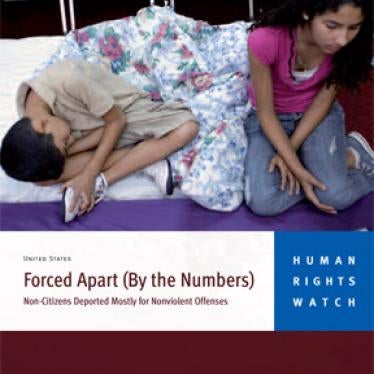Every day the U.S. government is forced to grapple with the consequences of harsh and sweeping immigration laws passed by Congress 13 years ago. Under the 1996 laws, detention and deportation are mandatory for thousands of immigrants convicted of nonviolent crimes, and judges are powerless to intervene, even in the most deserving cases.
A report by an adviser to the Department of Homeland Security released last week by the Obama administration says that the majority of the approximately 300,000 immigrants detained and deported each year are banished for nonviolent crimes. The report asks why it is necessary to lock up nonviolent persons -- who have already served their criminal sentences but who are awaiting deportation hearings -- in jails and prisons, places intended for punishment.
On October 13, the U.S. Supreme Court heard the case of Jose Padilla (not the terrorism defendant), who asked the court to decide that he, and others like him, are entitled to accurate information from their criminal defense attorneys about their chances of deportation after pleading guilty to a crime. Padilla, a Honduran citizen who lived legally in the United States for nearly 40 years and served in the U.S. armed forces in Vietnam, pled guilty to three marijuana offenses after his lawyer incorrectly advised him that the plea would have no effect on his immigration status.
Now Padilla faces mandatory detention and deportation after he completes his 10-year prison sentence. His only chance to beat deportation is if the court decides to allow him to withdraw his guilty plea because he was misinformed.
This case is just one example of how Congress' excessive detention and deportation laws -- which also violate human rights -- are wasting the time and efforts of both the courts and executive agencies.
According to Human Rights Watch's analysis of government statistics in 2009, one million immigrants had been deported from the United States under these harsh laws. One in five had been in the country legally, sometimes for decades. For three quarters of the deportees, any criminal history was limited to nonviolent offenses such as marijuana or cocaine possession. At least one million spouses and children, many of them U.S, citizens, had been separated from their family members because of these deportations. And a minimum of $300 million was spent to deport people on criminal grounds in fiscal year 2007 alone.
Immigrants, like everyone else, should be punished when they commit crimes, including non-violent offenses such as theft or fraud. The point is that these people being deported already have been punished. Why should they also be subject to mandatory detention and deportation after serving their time? The long histories of legal presence in the United States, and other connections - such as US citizen spouses and children or military service - that many of them have should at least be weighed before they are locked up again and subsequently deported.
If Congress freed judges to exercise limited discretion in these cases, detention beds could be more logically filled with people facing removal for serious violent crimes. The Supreme Court could spend its time on other matters. And many American families would not be forced apart. Thirteen years of costly excess is enough.







